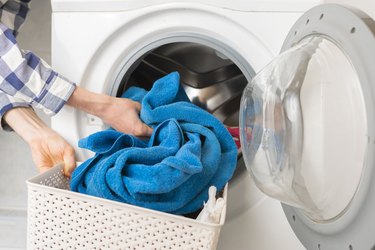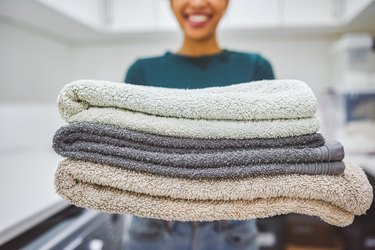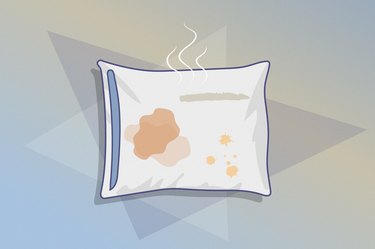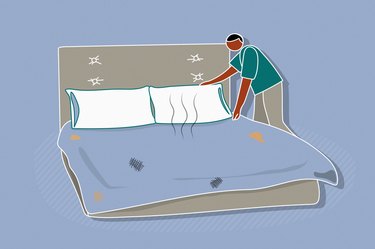
After a long day, there's nothing like a refreshing shower to get rid of all the grit and grime, and a fluffy towel to wrap around your squeaky-clean body. That is, unless your bath towel is teeming with microbes (read: hasn't been washed in weeks).
Yup, we said it. Just because you're dirt-free when you dry off doesn't mean germs can't latch onto your bath linens. In fact, your towels can become especially troubling if you don't wash them enough.
Video of the Day
Video of the Day
Here, Stacy Chimento, MD, a board-certified dermatologist at Riverchase Dermatology, dishes on towel hygiene: how often to wash them and the best way to suds them up to keep them sanitary.
You Should Clean Your Towels More Often Than You Think
When it comes to your bath towel, wash it every three to four uses or once a week at minimum, Dr. Chimento says.
But if you shower at the gym and pack your wet towel in your gym bag — which is a breeding ground for bacteria and other germs — use a fresh towel every day, per the Cleveland Clinic.
Hand towels and washcloths should be washed more frequently than bath towels because they're used more often and by multiple people, Dr. Chimento says. Translation: They're germ magnets.
Case in point: A September 2014 study in Food Protection Trends found fecal bacteria on 89 percent of hand towels used to dry dishes, hands and other surfaces in the kitchen.
And hand towels hanging in bathrooms may fare even worse. That's because if you leave the toilet lid up during a flush, pesky pathogens can scatter into the air and hitch a ride on your towels. Gross, but true.
A March 2013 literature review in the American Journal of Infection Control concluded that potentially infectious microbes can become aerosolized when you flush the toilet.
A good rule of thumb is to launder these shared bath linens every two to three days (and shut the toilet lid when you flush).
Tip
Rather than hang your towel on a hook, spread it out evenly on a towel bar to help it dry thoroughly between uses, per the Cleveland Clinic. The quicker it dries, the less likely it’ll have time to accumulate germs.
What Happens if You Don’t Wash Your Towels Regularly?
Hate to break it to you, but grubby towels aren't only gross — they can affect your health too. Here, Dr. Chimento explains the multiple ways unwashed towels can be bad for you.
1. Skin Infections
Damp, dirty towels can incubate bacteria and fungus that can spread viruses like toenail fungus, athlete's foot, jock itch or warts, Dr. Chimento says.
If you're suffering from any of these skin infections, use sterile towels to ensure bacteria doesn't travel to other parts of the body, she says.
2. Rashes
A dry, itchy, red rash is a red flag that it's time to toss your towel in the wash. Yeasts, molds, viruses and bacteria can multiply in moist places like soggy towels and aggravate your skin.
For example, "Eczema, or atopic dermatitis, is a skin condition that is caused by inflammation due to staphylococcus bacteria," Dr. Chimento says. "Dirty towels can drag these bacteria to other areas of the body and irritate the skin, causing eczema flare-ups."
3. Breakouts
Tainted towels can also trigger acne to form on the face and body, Dr. Chimento says.
Again, unclean, clammy towels are the ideal environment for yeast, bacteria and other flora to flourish. And these nasty microbes can possibly propagate pimples.
4. Illness
You can easily spread the common cold by sharing soiled hand towels. "Not washing hand towels can cause germs associated with different colds to be transmitted from one person to another," Dr. Chimento says.
"In more extreme cases, dirty towels can actually spread the bacteria associated with MRSA, which is a dangerous staph infection difficult to treat with antibiotics," she adds.
How to Wash Towels

To keep your towels in tip-top shape, Dr. Chimento shares the following tips to banish bacteria and other creepy critters from you bath linens:
- Wash towels separately. Tossing in your towels with other clothing can lead to germs spreading.
- Wash in hot or warm water to kill more germs.
- When possible, use bleach for a better clean.
- If you have sensitive skin, stick to detergent and dryer sheets that are labeled "for sensitive skin" and skip scented products to avoid irritation.
- Don't let towels sit in the washer for an extended period of time to avoid bacteria forming.
- Dry towels on high heat.
Is this an emergency? If you are experiencing serious medical symptoms, please see the National Library of Medicine’s list of signs you need emergency medical attention or call 911.


